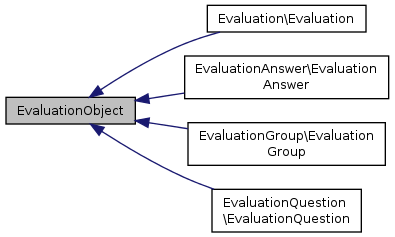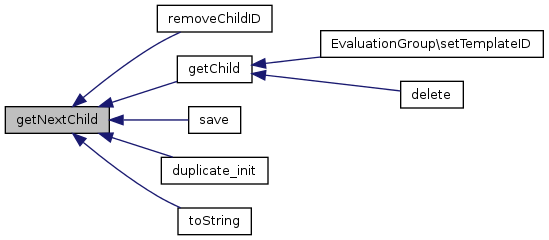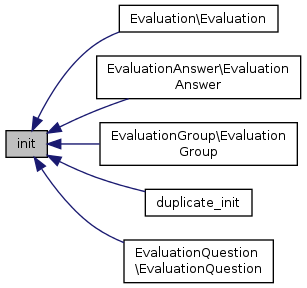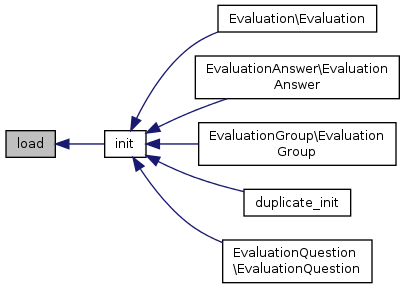Public Member Functions |
| | EvaluationObject ($objectID="", $parentObject=NULL, $loadChildren=EVAL_LOAD_NO_CHILDREN) |
| | setTitle ($title, $encoded=false) |
| | getTitle ($escaped=false) |
| | setText ($text, $encoded=false) |
| | getText ($escaped=false) |
| | setPosition ($position) |
| | getPosition () |
| | setParentObject (&$parentObject) |
| | getParentObject () |
| | getParentID () |
| | setParentID ($parentID) |
| | removeChildID ($childID) |
| | addChild (&$child) |
| & | getChild ($childID="") |
| & | getNextChild () |
| | getChildren () |
| | getNumberChildren () |
| | save () |
| | delete () |
| & | duplicate () |
| | duplicate_init () |
| | init ($objectID="") |
| | load () |
| | check () |
| | getSpecialChildobjects (&$object, $instanceof, $reset=false) |
| | toString () |
| | StudipObject ($objectID="") |
| | createNewID () |
| | getObjectID () |
| | setObjectID ($objectID) |
| | getAuthorID () |
| | getAuthor () |
| | getFullname () |
| | setAuthorID ($authorID) |
| | getRangeID () |
| | setRangeID ($rangeID) |
| | AuthorObject () |
| | finalize () |
| | setAuthorEmail ($email) |
| | getAuthorEmail () |
| | setAuthorName ($name) |
| | getAuthorName () |
| | x_instanceof () |
| | isError () |
| | getErrors () |
| | resetErrors () |
| | throwError ($errcode, $errstring, $errline=0, $errfile=0, $errtype=ERROR_NORMAL) |
| | throwErrorFromClass (&$class) |
| | errorHandler ($no, $str, $file, $line, $ctx) |
Member Function Documentation
Deletes the object from the database public
Duplicates the evaluation object. WARNING: Stored childs will be modified :( public
Initialisation for duplicated objects private
Constructor
- Parameters
-
| string | $objectID | The ID of an existing object |
| EvaluationObject | $parentObject | The parent object |
| integer | $loadChildren | See const EVAL_LOAD_*_CHILDREN public |
| & getChild |
( |
|
$childID = "" | ) |
|
Gets the first child and removes it (if no id is given) public
- Parameters
-
| string | $childID | The child id |
- Returns
- object The first object
Gets all the childs in the object public
- Returns
- array An array full of childObjects
Reimplemented in Evaluation.
Gets the next child public
- Returns
- object The next object, otherwise NULL
Gets the number of children public
- Returns
- integer Number of children
Gets the parentObjectID public
- Returns
- string The parentObjectID
Gets the parentObject public
- Returns
- object The parentObject.
Gets the position public
- Returns
- string The position
| getSpecialChildobjects |
( |
& |
$object, |
|
|
|
$instanceof, |
|
|
|
$reset = false |
|
) |
| |
Gets all children of a special kind
- Parameters
-
| EvaluationObject | &$object | the parent object |
| string | $instanceof | instance of the searched child |
| boolean | $reset | for internal use public |
| getText |
( |
|
$escaped = false | ) |
|
Gets the text public
- Parameters
-
| boolean | $escaped | If YES, the string is escaped |
- Returns
- string The text
| getTitle |
( |
|
$escaped = false | ) |
|
Gets the title public
- Parameters
-
| boolean | $escaped | If YES, the string is escaped |
- Returns
- string The title
Initialisation for objects private
- Parameters
-
| string | $objectID | The object id |
Loads the Object from the database private
| removeChildID |
( |
|
$childID | ) |
|
Removes a child from the object (not from the DB!) public
- Parameters
-
| string | $childID | The child id |
Saves the object into the database public
Sets the parentObjectID public
- Parameters
-
| string | $parentID | The parent id |
| setParentObject |
( |
& |
$parentObject | ) |
|
Sets the parentObject public
- Parameters
-
| string | &$parentObject | The parentObject. |
Sets the position public
- Parameters
-
| string | $position | The position. |
| setText |
( |
|
$text, |
|
|
|
$encoded = false |
|
) |
| |
Sets the text public
- Parameters
-
| string | $text | The text. |
| boolean | $encoded | YES, if text is escaped (e.g. with addslashes) and have html special chars. |
- Exceptions
-
| setTitle |
( |
|
$title, |
|
|
|
$encoded = false |
|
) |
| |
Sets the title public
- Parameters
-
| string | $title | The title. |
| boolean | $encoded | YES, if text is escaped (e.g. with addslashes) and have html special chars. |
- Exceptions
-
Field Documentation
Is used as a counter for getNextChild ) private
Array with all linked childobjects private
Holds the DB object private
Defines how many children to load. See EVAL_LOAD_*_CHILDREN private
Counts the number of childs private
The parent object private
Position of this group in parent object private
Text of the group private
Title of the group private
The documentation for this class was generated from the following file:
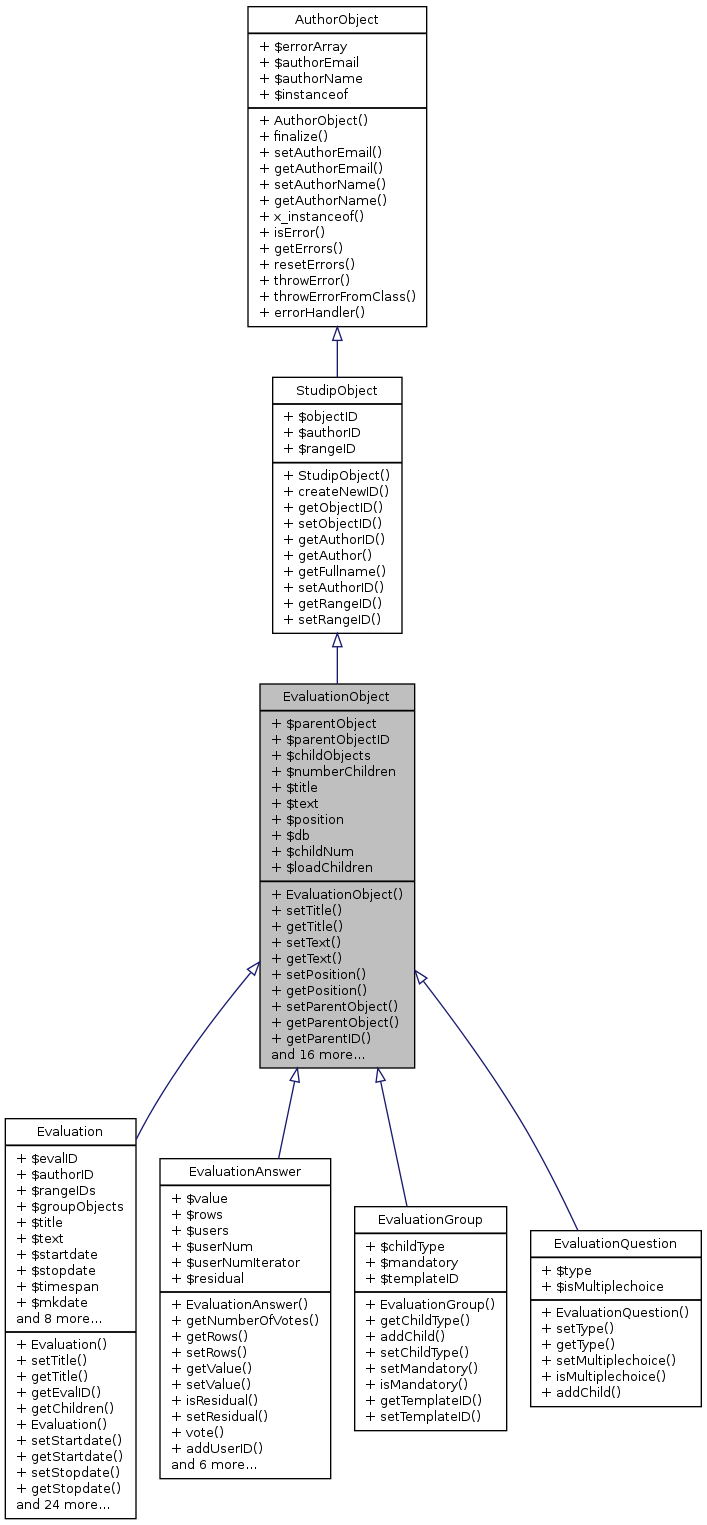

 Public Member Functions inherited from StudipObject
Public Member Functions inherited from StudipObject Public Member Functions inherited from AuthorObject
Public Member Functions inherited from AuthorObject Data Fields inherited from StudipObject
Data Fields inherited from StudipObject Data Fields inherited from AuthorObject
Data Fields inherited from AuthorObject




